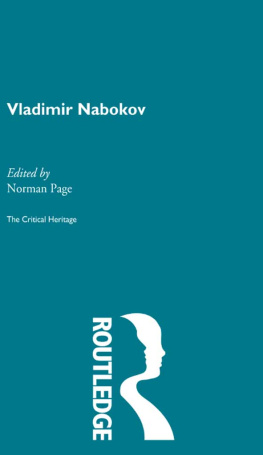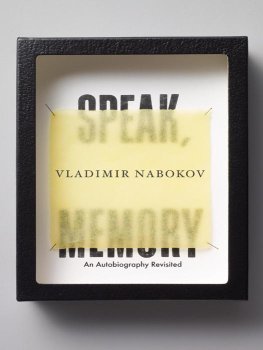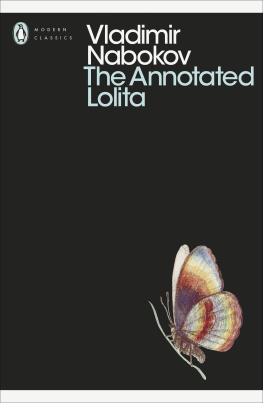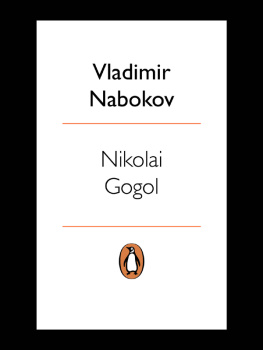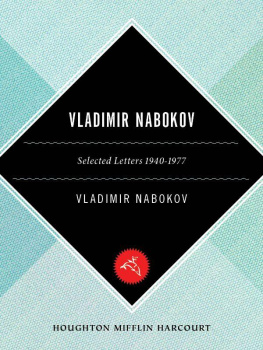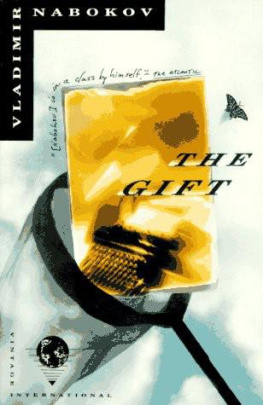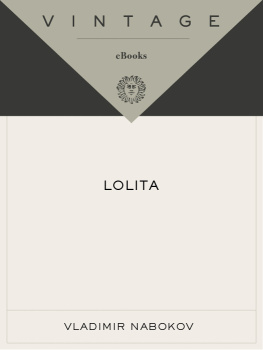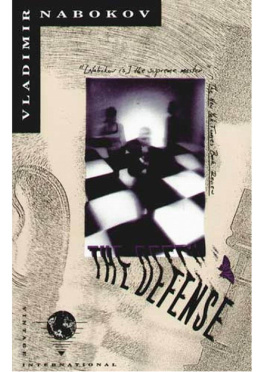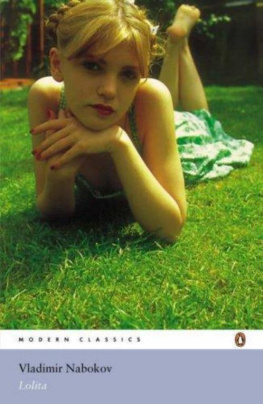Norman Page - Vladimir Nabokov : The Critical Heritage
Here you can read online Norman Page - Vladimir Nabokov : The Critical Heritage full text of the book (entire story) in english for free. Download pdf and epub, get meaning, cover and reviews about this ebook. year: 2013, publisher: Routledge, genre: Art. Description of the work, (preface) as well as reviews are available. Best literature library LitArk.com created for fans of good reading and offers a wide selection of genres:
Romance novel
Science fiction
Adventure
Detective
Science
History
Home and family
Prose
Art
Politics
Computer
Non-fiction
Religion
Business
Children
Humor
Choose a favorite category and find really read worthwhile books. Enjoy immersion in the world of imagination, feel the emotions of the characters or learn something new for yourself, make an fascinating discovery.
- Book:Vladimir Nabokov : The Critical Heritage
- Author:
- Publisher:Routledge
- Genre:
- Year:2013
- Rating:4 / 5
- Favourites:Add to favourites
- Your mark:
- 80
- 1
- 2
- 3
- 4
- 5
Vladimir Nabokov : The Critical Heritage: summary, description and annotation
We offer to read an annotation, description, summary or preface (depends on what the author of the book "Vladimir Nabokov : The Critical Heritage" wrote himself). If you haven't found the necessary information about the book — write in the comments, we will try to find it.
Vladimir Nabokov : The Critical Heritage — read online for free the complete book (whole text) full work
Below is the text of the book, divided by pages. System saving the place of the last page read, allows you to conveniently read the book "Vladimir Nabokov : The Critical Heritage" online for free, without having to search again every time where you left off. Put a bookmark, and you can go to the page where you finished reading at any time.
Font size:
Interval:
Bookmark:
VLADIMIR NABOKOV: THE CRITICAL HERITAGE
THE CRITICAL HERITAGE SERIES
General Editor: B. C. Southam
The Critical Heritage series collects together a large body of criticism on major figures in literature. Each volume presents the contemporary responses to a particular writer, enabling the student to follow the formation of critical attitudes to the writers work and its place within a literary tradition.
The carefully selected sources range from landmark essays in the history of criticism to fragments of contemporary opinion and little published documentary material, such as letters and diaries.
Significant pieces of criticism from later periods are also included in order to demonstrate fluctuations in reputation following the writers death.

First published in 1982
Reprinted in 1997, 2000 by Routledge
2 Park Square, Milton Park,
Abingdon, Oxon, OX14 4RN
&
711 Third Avenue,
New York, NY 10017
Transferred to Digital Printing 2007
Routledge is an imprint of the Taylor & Francis Group
First issued in paperback 2013
Compilation, introduction, notes and index 1982 Norman Page
All rights reserved. No part of this book may be reprinted or reproduced or utilized in any form or by any electronic, mechanical, or other means, now known or hereafter invented, including photocopying and recording or in any information storage or retrieval system, without permission in writing from the publishers.
British Library Cataloguing in Publication Data
ISBN 978-0-415-15916-6 (hardback)
ISBN 978-0-415-84966-1 (paperback)
ISBN 978-1-136-21004-4 (ePub)
Publishers Note
The publisher has gone to great lengths to ensure the quality of this reprint but points out that some imperfections in the original may be apparent
General Editors Preface
The reception given to a writer by his contemporaries and near-contemporaries is evidence of considerable value to the student of literature. On one side we learn a great deal about the state of criticism at large and in particular about the development of critical attitudes towards a single writer; at the same time, through private comments in letters, journals or marginalia, we gain an insight upon the tastes and literary thought of individual readers of the period. Evidence of this kind helps us to understand the writers historical situation, the nature of his immediate reading-public, and his response to these pressures.
The separate volumes in the Critical Heritage Series present a record of this early criticism. Clearly, for many of the highly productive and lengthily reviewed nineteenth and twentieth-century writers, there exists an enormous body of material; and in these cases the volume editors have made a selection of the most important views, significant for their intrinsic critical worth or for their representative quality perhaps even registering incomprehension!
For earlier writers, notably pre-eighteenth century, the materials are much scarcer and the historical period has been extended, sometimes far beyond the writers lifetime, in order to show the inception and growth of critical views which were initially slow to appear.
In each volume the documents are headed by an Introduction, discussing the material assembled and relating the early stages of the authors reception to what we have come to identify as the critical tradition. The volumes will make available much material which would otherwise be difficult of access and it is hoped that the modern reader will be thereby helped towards an informed understanding of the ways in which literature has been read and judged.
B.C.S.
To Edward and Marian Griew
Every effort has been made to locate copyright holders, but the editor and publishers regret that it has proved impossible to trace some of them. We wish to thank the following for permission to reprint copyright material: Ardis Publishers for No. 2; Art International for No. 61; Georges Borchardt, Inc., for No. 31, from The Reporter ( 1962); Brigid Brophy for No. 68 ( Brigid Brophy 1972); the Daily Telegraph for Nos 27 and 32; Denis Donoghue for No. 58; Encounter for Nos 25, 43 and 70; the Guardian for No. 36; Harcourt Brace Jovanovich, Inc., for No. 16, from Speaking of Literature and Society by Lionel Trilling (Copyright 1980 by Diana Trilling and James Trilling); The Hudson Review for No. 55, reprinted by permission from The Hudson Review, Vol. XIX, No. 3 (Autumn, 1966) (Copyright 1966 by The Hudson Review, Inc.); The Kenyon Review for Nos 15 and 19 (Copyright 1957 by Kenyon College); Frank Kermode for No. 12; The Nation (New York) for No. 50; The New Republic for Nos 8, 23, 29, 38 and 56 ( 1947, 1959, 1962, 1964, 1966 The New Republic, Inc.); the New Statesman for Nos 10, 18, 20, 34, 40, 44, 49, 57, 73 and 75; The New York Review of Books for No. 47 (reprinted with permission from The New York Review of Books. Copyright 1965 Nyrev, Inc.); The New York Review of Books for No. 62 (reprinted with permission from The New York Review of Books. Copyright 1969 Nyrev, Inc.); The New York Times for Nos 5, 35. 39 and 72 ( 1942, 1963, 1964, 1974 by The New York Times Company. Reprinted by permission); The New Yorker for No. 37 (Reprinted by permission; 1964 The New Yorker Magazine, Inc.); Partisan Review and John Hollander for No. 13 ( 1956 by Partisan Review, Inc.); Partisan Review and Dwight Macdonald for No. 30 ( 1962 by Partisan Review. Inc.): Paul Pickrel for No. 22. from Harpers Magazine ( Paul Pickrel 1959); Poetry for No. 46 (Copyright 1965 by The Modern Poetry Association); Punch for No. 11; Saturday Review for Nos 9, 59 and 69 (Copyright 1947, 1969, 1973 by Saturday Review. All rights reserved. Reprinted by permission); Slavonic and East European Review for No. 1; the Spectator for Nos 7, 17, 21, 41, 45 and 53; Times Newspapers Ltd for Nos 24, 28, 48, 52, 64 and 67 from the Times Literary Supplement and No. 74 from The Times; Stephen Wall for No. 42; Weiden-feld & Nicolson Ltd, William Morrow & Co., Inc., and Robert Alter for No. 63, from Nabokov: A Tribute, ed. Peter Quennell (Copyright 1979 by George Weidenfeld & Nicolson Ltd); The Yale Review for Nos 60 and 66 (Copyright 1969, 1971 by Yale University); the Yorkshire Post for Nos 26 and 33.
I
Nabokovs biography of Gogol, the Russian writer with whom he has been most often compared, begins with the subjects death and ends with his birth; and the critical reception of Nabokovs work is infected by something of the same topsy-turvy quality. This is partly because, although his literary activity covered some sixty years, fame came to him very late. But in order fully to explain how it came about that reviewers in the English-speaking world were confronted by some of his early novels only after some of the later novels had been widely read and discussed, it will be necessary to sketch the highly unusual pattern of his career.
At home in both Russian and English from his earliest years, Nabokov began writing in Russian very young; and a volume of his poems was privately printed when he was seventeen. This elicited his first review: a journalist who had reason to be grateful to my father wrote an impossibly enthusiastic piece about me. The review was never published but, according to the account in Nabokovs autobiography, it had a far-reaching effect upon his attitude to his critics:
The whole business cured me permanently of all interest in literary fame and was probably the cause of that almost pathological and not always justified indifference to reviews which in later years deprived me of the emotions most authors are said to experience. (Speak, Memory 1967, 2389)
Next pageFont size:
Interval:
Bookmark:
Similar books «Vladimir Nabokov : The Critical Heritage»
Look at similar books to Vladimir Nabokov : The Critical Heritage. We have selected literature similar in name and meaning in the hope of providing readers with more options to find new, interesting, not yet read works.
Discussion, reviews of the book Vladimir Nabokov : The Critical Heritage and just readers' own opinions. Leave your comments, write what you think about the work, its meaning or the main characters. Specify what exactly you liked and what you didn't like, and why you think so.

